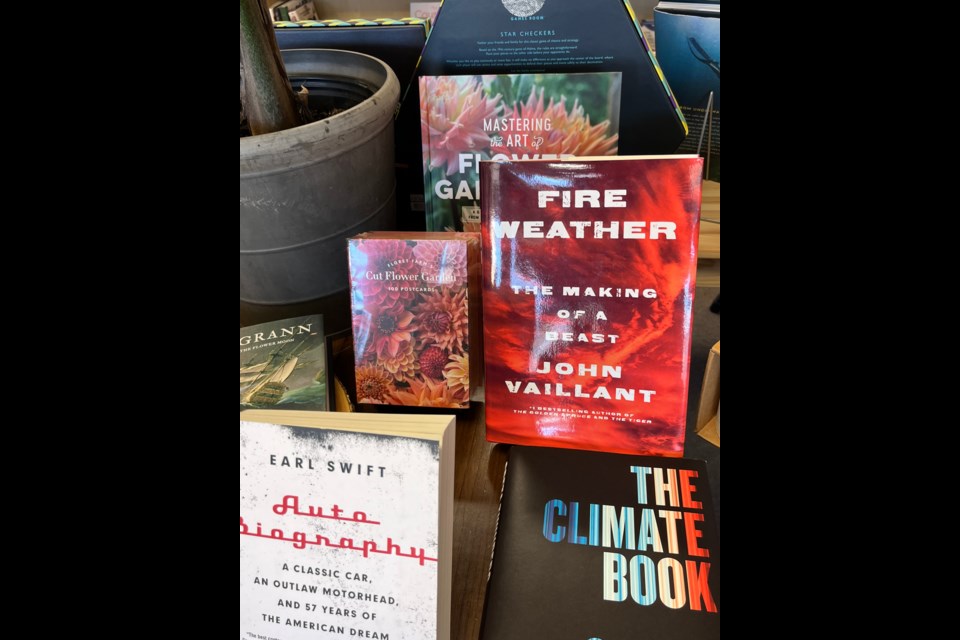STORY UPDATE
Announced on November 16, Fire Weather: A True Story from a Hotter World, by BC author, John Vaillant, has been named winner of the Baillie Gifford (BG) prize for non-fiction 2023. The annual award ceremony took place in London England, hosted at the Science Museum.
According to the The Baillie Gifford prize website: The award is open to authors of any nationality and covers all non-fiction in the areas of current affairs, history, politics, science, sport, travel, biography, autobiography and the arts.
The winning author receives £50,000 ($85,000 Canadian dollars) and since it was the 25 year anniversary for the British prize, the other shortlisted authors would also received £5,000 or over $8000 Canadian dollars.
ORIGINAL STORY
BC award-winning author of The Golden Spruce, John Vaillant, has been gathering data and researching the world’s changing climate for the past seven years in order to prepare his newest nonfiction book, Fire Weather.
“We are on a trend right now,” said Vaillant. “The shift in climate is coming from the south; we saw Australia, we saw California, and this year, Washington State, Southern BC and Northern BC [referring to increase in wildfires].”
From Vaillant’s research, he comes to the conclusion that the planet is going through a regional and planetary regime change. Some called it a “phase shift.”
“That’s going to be our experience of the 21st century, seeing those changes take place and they are not going to be evenly distributed,” said Vaillant.
Climate changes are taking place all over the world; however, how we experience it will be different, depending on many factors, including personal, cultural, political and economic factors, he added.
“Based on everything I have seen and studied over the past seven years, our sense of what we can expect cannot be based on past experience,” said Vaillant. “For example, California has had a 300 per cent increase in snowpack this year, after a series of hellacious wildfire years. What we are going to get is a see-sawing of extremes.”
The author referenced the qathet region, saying that although it seems to be experiencing less instability than the southern Sunshine Coast (with drought), and could be a wet, stable little pocket, he believes that could change any time.
Fire Weather begins in the oil and gas hub of Fort McMurray in May 2016. The town was torched by a wildfire that destroyed neighbourhoods and drove 88,000 people from their homes in a day.
“The Boreal Forest encircles the northern-hemisphere and it’s been going through a gradual change,” said Vaillant. “What we are seeing in Siberia and Russia are bigger, hotter fires. We have this sense of what the Boreal forest is: huge, vast, rivers, lakes and trees, that’s our sense of it.”
Vaillant said that, unfortunately, this view is outdated.
“We are increasingly seeing rivers all over the world drying up, like the Amazon, the Rhine and Seine; these are famous rivers we think of as constant,” he added.
Valiant started looking at larger systems to get a sense of climate stress indicators.
“It doesn’t matter if you are talking about Antarctic ice, sea surface temperature off the coast of Ireland, coral reef bleaching off the coast of Australia or forest fires in Canada, everywhere on earth has local indicators of climate distress,” said Vaillant.
Like in previous books Vaillant has written, he looks at confounding human behaviour, which he said is a factor in how we deal with climate change, and behaviour that goes against long term survival, in order for short term gain.
“People have loyalty to the status quo; if things are going reasonably well, you want to keep doing that thing,” said Vaillant. “But that’s being disrupted now, and people don’t want to give [carbon fuel] up.”
Vaillant testified to the Canadian Parliament on October 16, when he said “the oil industry is a fire industry, a CO2 industry, a climate change industry. Big Oil knew the threat of fossil fuel burning and suppressed the evidence. The result is staggering levels of climate fire. Temperatures in the Fort McMurray fire hit 500 degrees celsius.
“What Shell is doing, and Exxon abandoning their low-carbon projects and doubling down on the profit, they are expanding production, and not even attempting to greenwash,” said Vaillant. “They have their gloves off and saying ‘to hell with the rest of you and the planet.’”
Vaillant will be presenting Fire Weather at Powell River Public Library on Tuesday, November 28.
Join the Peak’s email list for the top headlines right in your inbox Monday to Friday.



